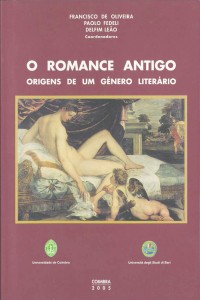Please use this identifier to cite or link to this item:
https://hdl.handle.net/10316.2/39254| DC Field | Value | Language |
|---|---|---|
| dc.contributor.author | Brandão, José Luís Lopes | |
| dc.date.accessioned | 2016-08-02T16:28:51Z | |
| dc.date.accessioned | 2020-09-08T18:14:53Z | - |
| dc.date.available | 2016-08-02T16:28:51Z | |
| dc.date.available | 2020-09-08T18:14:53Z | - |
| dc.date.issued | 2005 | - |
| dc.identifier.isbn | 972-9057-21-4 | |
| dc.identifier.isbn | 978-989-26-1229-4 (PDF) | |
| dc.identifier.uri | https://hdl.handle.net/10316.2/39254 | - |
| dc.description.abstract | Charite’s story, in the Metamorphoses of Apuleius, reveals several tragic elements, such as the structure, the passage from happiness to misfortune, the strong presence of tyche (represented in the romance by the Fortuna caeca), a kind of hamartia, the progression to the catastrophe and the two oneiric experiences. Charite’s dreams find a parallel in Aeschylus, Sophocles and especially in Euripides’ tragedies. In the second dream, Tlepolemus himself discloses to his wife the crime in which he was the victim. This situation recalls the ghost of Polidorus, in Euripides’ Hecuba, by the contents, by the kind of reactions caused in the protagonist, and by the process of revenge culminating in the act of blinding the murderer. If we accept the apologetic intention of the romance, Charite’s tragedy reveals moralizing and religious purposes (as suggested by the speech of Isis’ priest in 11.15), supported by the hope in liberation from the oppression of the Fortuna and in a post mortem redemption. | eng |
| dc.language.iso | por | - |
| dc.publisher | Centro de Estudos Clássicos e Humanísticos | por |
| dc.relation.ispartof | http://hdl.handle.net/10316.2/39242 | por |
| dc.rights | open access | - |
| dc.title | O romance de Carite em Apuleio: trágica admonição da providência | por |
| dc.type | bookPart | por |
| uc.publication.firstPage | 153 | - |
| uc.publication.lastPage | 166 | - |
| uc.publication.location | Coimbra | por |
| dc.identifier.doi | 10.14195/978-989-26-1229-4_12 | - |
| uc.publication.digCollection | PB | por |
| uc.publication.orderno | 12 | - |
| uc.publication.area | Artes e Humanidades | por |
| uc.publication.bookTitle | O romance antigo: origens de um género literário | - |
| uc.publication.manifest | https://dl.uc.pt/json/iiif/10316.2/39254/205971/manifest?manifest=/json/iiif/10316.2/39254/205971/manifest | - |
| uc.publication.thumbnail | https://dl.uc.pt/retrieve/11090702 | - |
| uc.publication.parentItemId | 54632 | - |
| uc.itemId | 69208 | - |
| item.grantfulltext | open | - |
| item.fulltext | With Fulltext | - |
| Appears in Collections: | O romance antigo: origens de um género literário | |
Files in This Item:
| File | Description | Size | Format | |
|---|---|---|---|---|
| o_romance_de_cartite_em_apuleio.pdf | 13.43 MB | Adobe PDF |  |
Items in DSpace are protected by copyright, with all rights reserved, unless otherwise indicated.
